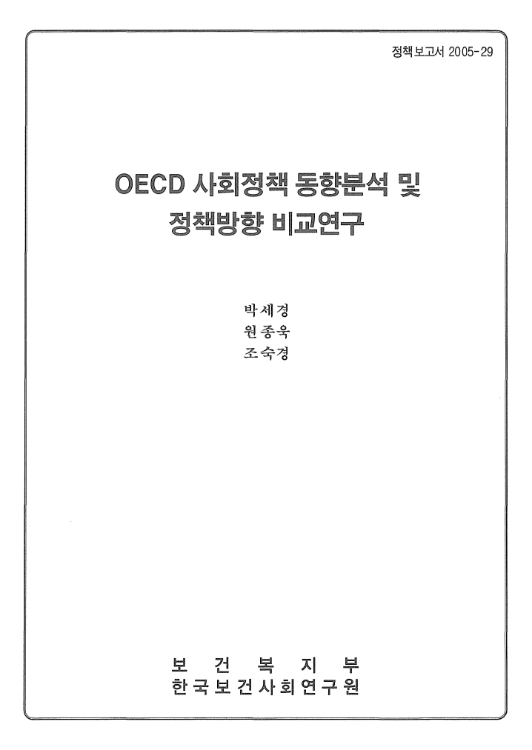단행본
OECD 사회정책 동향분석 및 정책방향 비교연구
- 제공처
- 정책연구관리시스템
- 다른언어제목
- Analysis on the Recent Trend of Active Social Policies among OECD Countries and Policy Implications
- 저자
- 박세경, 원종욱, 조숙경
- 출판사
- 한국보건사회연구원
- 발행연도
- 2005.
- 페이지
- 256
- URL
- 활용동의
- 동의
요약
This study originally aimed to prepare for the OECD social policy minister meeting entitled "Extending Opportunities: How Active Social Policy Can Benefit Us All" in Paris on 31 March and 1 April 2005. Therefore, one of the main parts of the study investigated the OECD document repotted the social policy experimentation of OECD countries over the past two decades. These experimentation focused on how to better integrate social and labour market interventions aimed at reducing poverty, exclusion and dependency among groups of people who dependent on welfare benefits. Economic growth has resulted in significant improvement in the social conditions of OECD countries over the 50 years. Although the continuous growth of economic will remain critical for these improvement in social conditions in the future, it is impossible that economic growth alone would not be enough to support well-functioning social institutions, in particular these devoted to providing social protection to families and individuals. Hence, this study concentrated to the case for active social policies, a concept that stresses the importance of shifting the focus of social programmes from insuring individuals against a few, well-defined, risks towards investing in their capabilities and making the best use of them. Referred to the life-course perspective, the study was structured around three key objectives of social policy in OECD countries as well as Korea respectively: 1) give children the best possible start in life through investing in children, boosting maternal employment, reconciling family and work responsibilities, and creating a framework favourable for raising fertility rates, 2) help prime-aged individuals overcome barriers to quality jobs through completing the welfare-to-work agenda, making progress with welfare-in-work, strengthening the effectiveness of social programmes to persons for whom paid work in the market economy is less feasible, promoting the coherence Of different policies affecting poverty and exclusion and making long-term commitments to achieve poverty-reduction goals, and 3) protect the well-being Of the elderly by enhancing their participation in economic and social life through limiting the costs of old-age pensions on public budgets, favouring a longer working life, and improving quality and access to long-term care.
미리보기

OECD 사회정책 동향분석 및 정책방향 비교연구.pdfPDF
첨부
| 번호 | 제목 | 유형 | |||
|---|---|---|---|---|---|
| 1 | OECD 사회정책 동향분석 및 정책방향 비교연구.pdf | 18.3 MB |
- 1OECD 사회정책 동향분석 및 정책방향 비교연구.pdfPDF18.3 MB
저자의 다른 자료
동일 저자의 최근 자료 최대 5건을 제공합니다.| 자료명 | 저자 | 발행일 |
|---|
